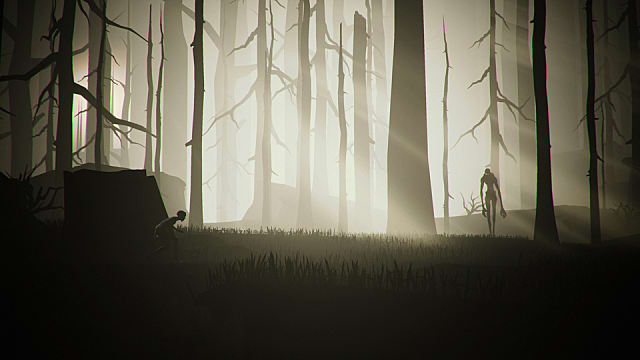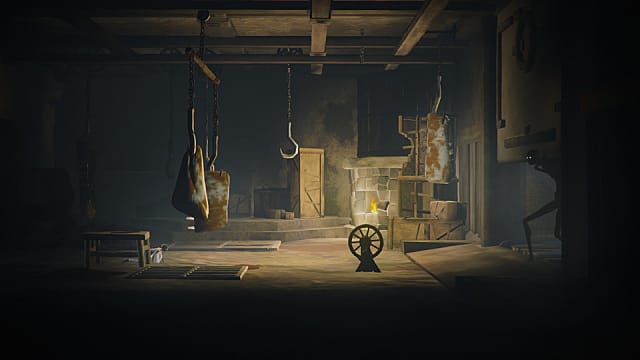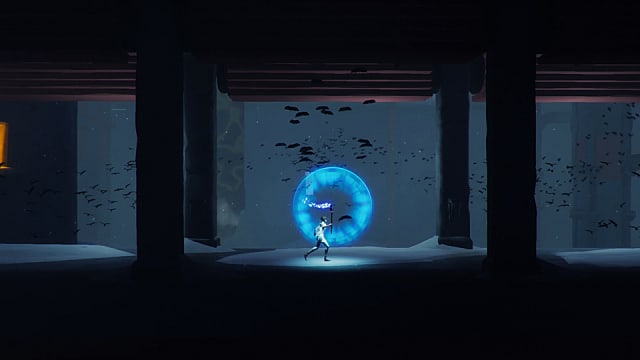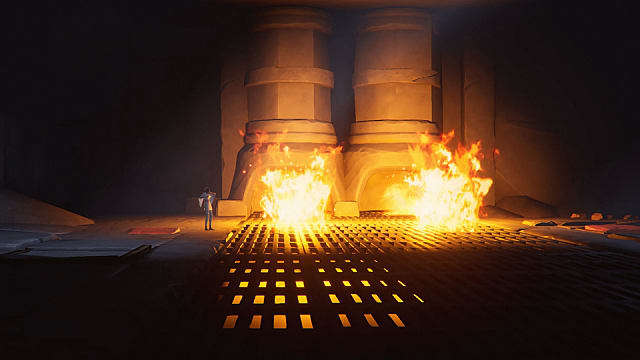

It's long been said that imitation is the sincerest form of flattery. If there's ample truth to that phrase, Stela is totally infatuated with games like Limbo and Inside.
The similarities are unavoidable, but that doesn't mean Stela fails to justify itself. For fans of cinematic platformers, Stela is a good one, with some interesting puzzles and striking scenery.
It just lacks any resounding, memorable moments like those Playdead titles have, which keeps Stela at the level of an interesting imitator but nothing more.
Stela tells an enigmatic tale of a woman escaping the apparent end of her world. Early sequences have her dodging unsettling, Slenderman-like creatures who kill on sight with brute force, while later levels take her to some sort of fiery furnace, the steeple of a bat-infested castle, and a purgatorial ether decked in ever-shifting geometry.
If you're trying to unravel what's really going on, your guess is as good as mine. Stela is more than happy to obfuscate its true meaning in metaphors barely penetrable on a first playthrough. Because the game only takes about two hours to complete, it's easy to go back through and see if you can dissect it better, though I still came out confused.
One clue may be the game's title which refers to a sort of grave. Grappling with life and death is a timeless theme in storytelling, but in Stela, you're left too confused to feel the weight of any of your actions.
The puzzles, meanwhile, have the opposite effect. They're a bit too easy to decipher, often immediately. Cinematic platformers tend to be less skill-based than things like Super Meat Boy and other genre counterparts, but in Stela, most puzzle setpieces are obvious at first glance, leaving you to simply perform the right moves to survive and move on.
If the game wants us to feel present in the protagonist's fight for survival, her escapes should be made narrower. As they are, the sense of danger is lost because you know you'll always avoid the fast-closing danger if you've done everything right, and right answers are so often telegraphed.
There is, at least, a lot of variety in the puzzles. Each section is like its own new mechanic and they rarely repeat. Stela also employs the foreground and background in ways I've not seen from this sort of game before. This gives the world an interesting element of 3D spacial movements in what is actually a 2D game.
When you do fail, the checkpoints are never more than a few seconds from where you left off. This helps the game avoid any frustrations, which is always a good thing, but the puzzles that lead you to some failures just don't pack the punch of Stela's inspirators.
While these words so far may sound harsh, they're only meant to convey the game's just-fine elements. It has other parts that rise above that, namely the setting and music. Combined, these set the stage much more strongly than the forgiving puzzles and drowned-in-metaphor story.
The music builds dramatically and plays off the screen in a faux-dynamic manner, given how so many puzzles are timed for you to just barely survive. It's okay that the music isn't really dynamic. It does a good job pretending.
Levels offer a ton of diversity, from the foggy treescapes that look like the remnants of a great, sweeping forest fire, to a dingy slaughterhouse, to other nightmarish scenes, too.
The entire game has a dream-like element to it, bordering on horror plenty of times. That's in part caused by the woman's almost levitating running style as she ducks, dodges, and sprints by dangers. The aesthetic variety is the game's greatest feat, and the singular way Stela rises above the games from which it so clearly takes its cues.
Pros:
- Constantly shifting set pieces make for a visually striking world
- Music is memorable, often quieted for effect and booming when it needs to be
- Some interesting use of 3D space in a 2D game
Cons:
- Puzzle solutions are often too obvious
- Story fails to deliver any payoff due to cloudy metaphors all over
Stela is not an essential entry to the cinematic platformer genre, but neither is it a bad one. It's good, but its biggest transgression is failing to leave its mark in any memorable way. It follows in the footsteps of Playdead's enormously popular platformers, and though games are invited to try to raise that bar, Stela fails to do so.
If you love games like Limbo and Inside, Stela is a good accompaniment, but it lacks the jaw-dropping moments or the inventive puzzles of those games it unabashedly looks up to.
[Note: A copy of Stela was provided by SkyBox Labs for the purpose of this review.]



0 comments:
Post a Comment